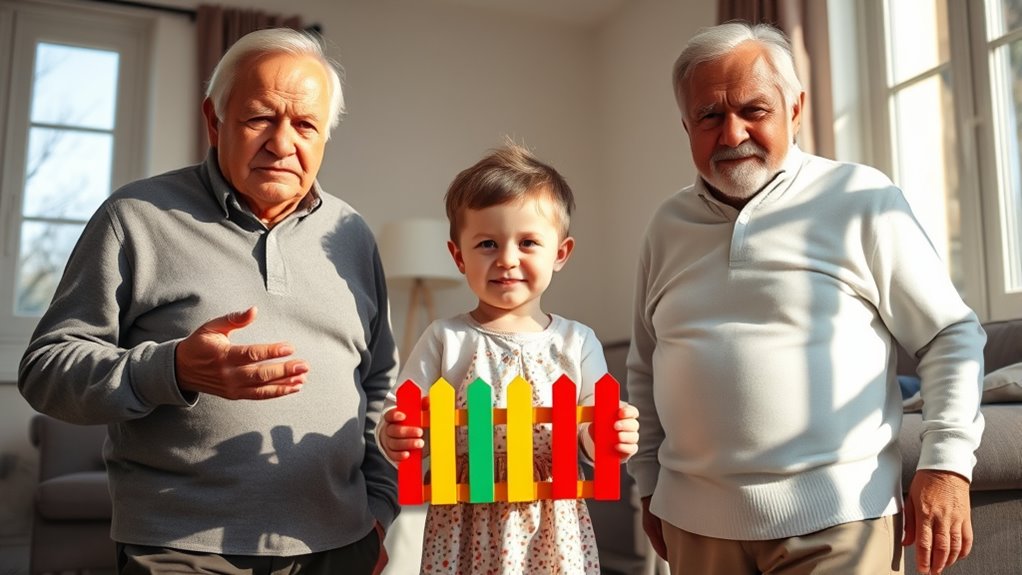To safeguard your children from narcissistic grandparents, set firm boundaries around their interactions. Clearly communicate acceptable behavior, like avoiding emotional manipulation or unnecessary gifts that could be used against your child later. Stay calm and consistent when enforcing limits, and teach your children they’re allowed to say no or remove themselves from uncomfortable situations. By establishing these boundaries, you create a safer environment. Keep exploring to learn how to effectively implement these strategies and ensure your child’s well-being.
Key Takeaways
- Clearly define and communicate acceptable behaviors and limits to prevent manipulation and emotional harm.
- Consistently enforce boundaries with calm assertiveness to protect children from narcissistic tactics.
- Teach children to recognize manipulation and empower them to say no or walk away.
- Limit grandparents’ unsupervised interactions and monitor for boundary violations or guilt-tripping.
- Prioritize your child’s emotional safety by reducing exposure to toxic behaviors and fostering respectful relationships.

Dealing with narcissistic grandparents can be incredibly challenging, especially when their behavior affects your emotional well-being and family dynamics. These grandparents often use emotional manipulation to influence your children and control situations to serve their own needs. They might shower your kids with excessive praise or gifts, only to later guilt-trip them or you for not giving enough attention. Their actions aren’t always obvious, but over time, they can erode boundaries and create confusion for both you and your children. That’s why establishing firm limits is essential. You need to be clear about what behaviors are acceptable and what aren’t, and communicate these boundaries consistently. This sends a strong message to your children that they are safe and protected from emotional harm. When you set limits, it’s important to remain calm and assertive, avoiding guilt or apologies that could give your grandparents leverage. Remember, your primary role is to safeguard your children’s emotional health, and boundaries are your tools for doing so.
It’s natural to want your children to have a loving relationship with their grandparents, but that doesn’t mean sacrificing your peace of mind. You can encourage positive interactions while also protecting them from emotional manipulation. For example, if your grandparents start to use guilt to get your children to do things their way, you can step in and redirect the conversation or change the subject. If they cross a boundary—like making inappropriate comments or overstepping your rules—address it immediately. Firmly but respectfully remind them of your limits. Consistency is key. If you allow certain behaviors one day but not the next, it sends mixed signals and weakens your boundaries. Your children rely on you to model healthy assertiveness and self-protection, so your actions should reinforce that message.
It’s also crucial to prepare your children for interactions with narcissistic grandparents. Teach them that it’s okay to say no or walk away if they feel uncomfortable. Reinforce that their feelings are valid and that they don’t have to accept emotional manipulation. By doing this, you empower your children to recognize inappropriate behaviors and respond confidently. Additionally, understanding dog breeds can help you identify healthy traits to encourage in your children’s interactions with others. Over time, these boundaries help reduce the impact of your grandparents’ narcissism, ensuring that your children’s emotional development isn’t compromised. Setting limits isn’t always easy, especially when faced with guilt or resistance, but it’s necessary to create a healthy environment. Trust your instincts, stay consistent, and prioritize your family’s emotional safety. Your proactive approach will help protect your children from undue influence while fostering respectful family relationships.
Frequently Asked Questions
How Can I Protect My Children From Emotional Manipulation?
To protect your children from emotional manipulation, set clear boundaries around grandparent influence and prioritize their emotional safety. Communicate openly with your children about their feelings, and teach them to recognize manipulation tactics. Limit their interactions if needed, and stay involved in their experiences. By establishing firm boundaries and fostering open dialogue, you help your children build resilience and maintain a healthy emotional environment despite challenging influences.
What Signs Indicate a Grandparent Is Narcissistic?
You’ll notice a narcissistic grandparent when they constantly seek admiration, dismiss your feelings, or steal the spotlight around your kids. Signs of grandparent manipulation include exaggerated stories, guilt-tripping, or acting as if they’re the ultimate authority. Watch for narcissistic traits like entitlement, lack of empathy, and an obsession with being the center of attention. If they make your children feel small or guilty, it’s time to set firm boundaries.
How Do I Handle Guilt From Setting Boundaries?
You handle guilt from setting boundaries by reminding yourself that it’s necessary for your children’s well-being. Practice managing parental guilt by focusing on your child’s best interests and understanding that healthy boundaries protect them from harm. When guilt arises, breathe deeply, affirm your choices, and seek support from trusted friends or a counselor. Remember, setting healthy boundaries isn’t selfish—it’s essential for fostering a safe, respectful environment for your family.
Can Boundaries Improve a Narcissistic Grandparent’s Behavior?
You might wonder if boundaries can change a narcissistic grandparent’s behavior, but often, they don’t. Narcissistic traits make it hard for them to respect limits, even with boundary setting. While boundaries can protect your children and reduce conflict, they rarely transform the grandparent’s personality. Still, establishing firm boundaries teaches your kids healthy relationships and shows you’re committed to their well-being, regardless of the grandparent’s response.
What Support Options Are Available for Affected Grandchildren?
You can find support through family therapy, which helps you process your feelings and develop coping strategies. Support groups offer a safe space to connect with others who understand your experiences, providing validation and advice. Consider seeking counseling for yourself or your children to build resilience and establish healthy boundaries. These options empower you to navigate relationships with narcissistic grandparents and protect your emotional well-being effectively.
Conclusion
Remember, setting boundaries is like planting sturdy fences around your garden—protecting your children from invasive weeds of manipulation and selfishness. You hold the key to your family’s peace, guiding your kids through the stormy seas of narcissism with calm, firm hands. By establishing clear limits, you create a safe harbor where love can flourish free from toxicity. Trust your instincts; you’re the lighthouse guiding your family home to calm waters.










